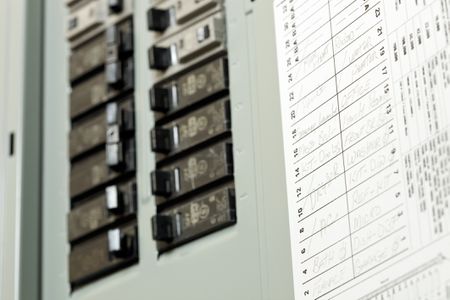Circuit breakers (also known as electrical panels or breaker boxes) are the heart of our homes— powering every modern electrical need. They filter energy through circuits to every part of your house: the fridge in the kitchen, the TV in the living room, the phone charger in the bedroom, along with every light fixture throughout your home.
If a dangerous amount of electricity flows through a circuit, the circuit trips or breaks. This halts the flow of energy and protects your home. Without circuit breakers, our homes wouldn’t function the way we need them to.
So what exactly is a dedicated circuit within your circuit breaker? Let us explain.
What is a dedicated circuit?
While one circuit can power several small devices or appliances (like a lamp, a TV, and a phone), dedicated circuits are reserved for one singular appliance.
This means that nothing else in your home can draw energy from that circuit. This is why it’s so important to label your circuits in your electrical panel.
Often, dedicated circuits are used for the larger appliances that need more electrical juice.
Which appliances need a dedicated circuit?
Dedicated circuits flow electricity to one single appliance, so which ones need that special attention? Think BIG!
Appliances that have a motor, are larger or perform hefty tasks require dedicated circuits. For instance, washers and dryers are one of the largest appliances in the home and they have a big job to do. They usually require a dedicated circuit each.
Other large appliances that need dedicated circuits include:
- Refrigerators
- Freezers
- Electric stoves and ovens
- Dishwashers
- Air conditioners
- Furnaces
- Hot tubs
- And other major appliances
What about smaller appliances?
Circuit breakers are designed to trip when too much electricity flows through them. If you are experiencing regular circuit trips in regard to specific smaller appliances, it might be worth having a dedicated circuit for them.
These smaller appliances could include:
- Microwaves
- Toaster ovens
- Garbage disposals
- Water heaters
- Electrical space heaters
- Window air conditioning units
- Garage door openers
- Sump pumps
- Even hair dryers
How do I know if I need a dedicated circuit?
First, get to know your electrical panel. Know which circuits are assigned to which appliances and spaces in your home.
Second, pay attention when a circuit trips. What was going on in that space or with that appliance? This can help you identify the need for a dedicated circuit.
Third, read the instructions when you get a new appliance.
Lastly, test your outlets using these steps.
Need help with dedicated circuits?
Do you still have questions about dedicated circuits? Shockley Electric is here to help! Contact us to have a licensed electrician help you assess your home’s needs.

